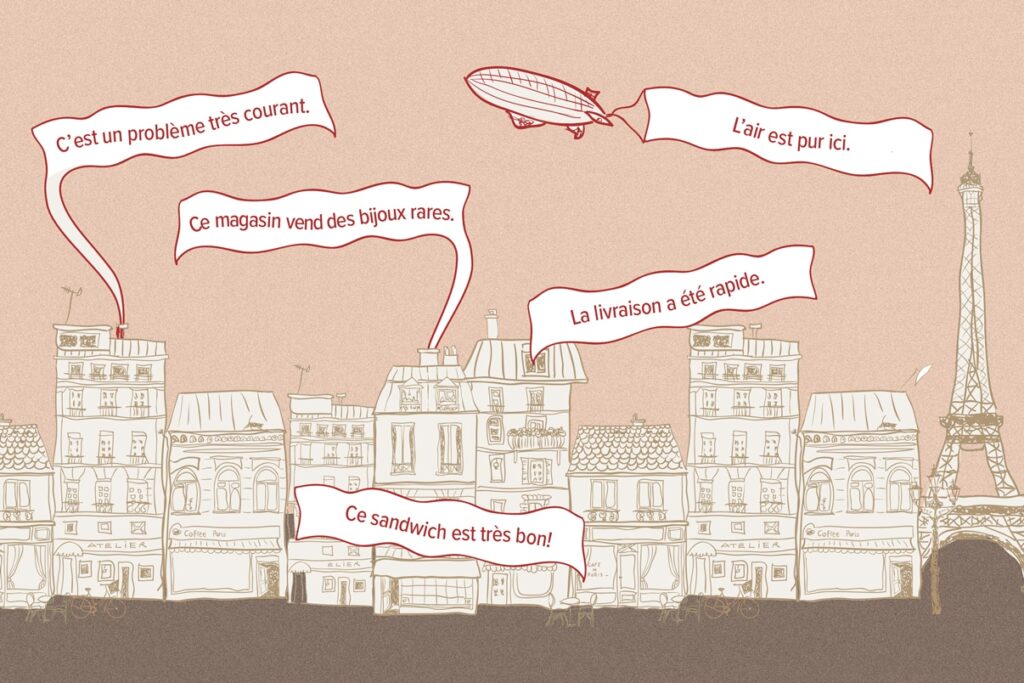Contents
- General French Adjectives
- French Adjectives for Emotions
- French Adjectives for Describing Personality
- French Adjectives About Appearance
- French Adjectives for Objects and Places
- French Adjectives for Color
- French Adjectives About Relationships
- French Adjectives About Money
- French Adjectives Related to Sound
- Miscellaneous French Adjectives
- Functional French Adjectives
- How to Use French Adjectives
- And One More Thing...
173 Essential French Adjectives

Adjectives are essential for adding depth and detail to your French, making your conversations more vivid and precise. By mastering these tools, you’ll enhance both your vocabulary and your confidence in speaking French.
Read on for 173 useful French adjectives, complete with audio pronunciation, conjugation information and example sentences. This guide also covers important grammar rules for adjectives, like word order and gender agreement.
We also have a video lesson on our YouTube channel if you’d like to learn adjectives in the context of a story:
Download: This blog post is available as a convenient and portable PDF that you can take anywhere. Click here to get a copy. (Download)
General French Adjectives
French Adjectives for Emotions
French Adjectives for Describing Personality
French Adjectives About Appearance
| Masculine | Feminine | English | Example |
|---|---|---|---|
| grand
grands | grande
grandes | tall, big | Elle est plus grande que moi. (She's taller than me.) |
| petit
petits | petite
petites | small | Mon cousin est petit pour son âge. (My cousin is small for his age.) |
| gros
gros | grosse
grosses | fat | Ses chats de compagnie sont gros et bien nourris. (Her pet cats are fat and well-fed.) |
| potelé
potelés | potelée
potelées | chubby, plump | Le bébé a des joues potelées et mignonnes. (That baby has cute and chubby cheeks.) |
| mince
minces | mince
minces | thin | Il évite les desserts pour rester mince.
(He avoids desserts to stay thin.) |
| joli
jolis | jolie
jolies | pretty | Elle porte une jolie robe. (She's wearing a pretty dress.) |
| laid
laids | laide
laides | ugly, unpleasant | Ce bâtiment est laid et délabré. (This building is ugly and run-down.) |
| beau
beaux | belle
belles | beautiful, handsome | Ils cherchent les belles choses de la vie. (They seek the beautiful things in life.) |
| moche
moches | moche
moches | ugly | Les vases sur le marché aux puces étaient tous moches. (The vases at the flea market were all ugly.) |
| en forme | en forme | in shape | Il fait des pompes tous les matins pour rester en forme. (He does push-ups every morning to stay in shape.) |
French Adjectives for Objects and Places
French Adjectives for Color
French Adjectives About Relationships
| Masculine | Feminine | English | Example |
|---|---|---|---|
| fidèle
fidèles | fidèle
fidèles | faithful | C'est un ami fidèle. (He's a loyal friend.) |
| infidèle
infidèles | infidèle
infidèles | unfaithful | Son mari était infidèle. (Her husband was unfaithful.) |
| marié
mariés | mariée
mariées | married | Ma sœur est mariée. (My sister is married.) |
| célibataire
célibataires | célibataire
célibataires | single | Ils sont tous les deux célibataires maintenant. (They're both single now.) |
French Adjectives About Money
| Masculine | Feminine | English | Example |
|---|---|---|---|
| économique
économiques | économique
économiques | economical | Prendre le train est économique. (Taking the train is economical.) |
| cher
chers | chère
chères | expensive | Ce portable est cher. (That laptop is expensive.) |
| fortuné
fortunés | fortunée
fortunées | wealthy | Ils font partie des familles les plus fortunées ici. (They're one of the wealthiest families here.) |
| endetté
endettés | endettée
endettées | in debt | Il est endetté jusqu'au cou. (He's in debt up to his neck.) |
| riche
riches | riche
riches | rich | Je veux devenir riche. (I want to become rich.) |
| pauvre
pauvres | pauvre
pauvres | poor | Ils sont trop pauvres pour acheter de nouvelles chaussures. (They're too poor to buy new shoes.) |
French Adjectives Related to Sound
| Masculine | Feminine | English | Example |
|---|---|---|---|
| bruyant
bruyants | bruyante
bruyantes | noisy | Ce bar est trop bruyant pour moi. (This bar is too noisy for me.) |
| musical
musicaux | musicale
musicales | musical | Ils aiment aller à des festivals musicaux. (They like going to music festivals.) |
| silencieux
silencieux | silencieuse
silencieuses | silent | La rue est tellement silencieuse la nuit. (The street is so silent at night.) |
Miscellaneous French Adjectives
Functional French Adjectives
The following don’t really serve to describe, but they work like adjectives:
| Feminine | English | Example | |
|---|---|---|---|
| autre autres | autre autres | another, other | Prenons un autre itinéraire pour éviter les embouteillages. (Let's take another route to avoid the traffic.) |
| plusieurs | plusieurs | several, many | J'ai acheté plusieurs souvenirs pour mes amis. (I bought several souvenirs for my friends.) |
| même mêmes | même mêmes | same | Ils suivent le même cours de français. (They're taking the same French course.) |
| seul
seuls | seule
seules | only, alone | C'est la seule façon de résoudre le problème. (This is the only way to solve the problem.) |
| entier
entiers | entière
entières | whole | J'ai lu le livre entier.
(I've read the whole book.) |
These include numerical adjectives, like double and triple .
French ordinal numbers such as première (first), deuxième (second), troisième (third) can also act as adjectives.
How to Use French Adjectives
Get these three points down before you start going crazy with the French adjectives above:
Word Order (B-A-N-G-S)
To be before the noun or to be after the noun? That is the question.
Adjectives Before the Noun
Remember this nice little acronym: B-A-N-G-S.
| Adjective Category | Examples |
|---|---|
| Beauty | joli(e) (pretty) belle/beau (beautiful) |
| Age | jeune (young) vieux/vieille (old) |
| Numbers | deux (two) quatorze (14) |
| Goodness | bon(ne) (good) mauvais(e) (bad) |
| Size | petit(e) (small) gros(se) (fat) haut(e) (high) |
Okay, one more thing. We didn’t add this to the acronym, because there’s just no room for an F, unless you want to call it B-FANGS. Functional adjectives like autre (other) and plusieurs (several) also go before the noun.
Adjectives After the Noun
Start cheering, because most descriptive adjectives go after the noun! Unlike in English, adjectives’ default spot is after the noun in French.
So if we’re talking color, taste, personality, mood, nationality or religious affiliation, then they go after the noun. Basically, when in doubt, just remember BANGS, (or B-FANGS if you’re up for using a rapper name), and in all other cases, tack it after the noun.
Adjectives with Multiple Meanings
There are actually French adjectives that completely change meaning based on where you decide to put them.
Here are some of them:
| Adjective | Meaning | Example |
|---|---|---|
| ancien(ne) | former | un ancien palais (a former palace) |
| old, ancient | un palais ancien (an ancient palace) | |
| brave | amiable | un brave héros (a likable hero) |
| courageous | un héros brave (a courageous hero) | |
| certain(e) | particular | une certaine marque (a certain brand) |
| sure | une valeur certaine (a sure winner) | |
| cher/chère | dear | ma chère bague (my precious ring) |
| expensive | ma bague chère (my expensive ring) | |
| curieux/curieuse | strange | un curieux étudiant (a strange student) |
| inquisitive | un étudiant curieux (an inquisitive student) | |
| grand(e) | great | un grand homme (a great man) |
| tall | un homme grand (a tall man) | |
| gros(se) | big | le gros chat (the big cat) |
| fat | le chat gros (the fat cat) | |
| pauvre | wretched | une pauvre veuve (a wretched widow) |
| not rich | une veuve pauvre (a not rich widow) | |
| propre | ownership | ma propre voiture (my own car) |
| clean | ma voiture propre (my clean car) | |
| pur(e) | simple | un pur esprit (a simple mind) |
| untainted | un esprit pur (an untainted mind) | |
| rare | precious | une rare peinture (a precious painting) |
| infrequent | une peinture rare (a rare painting) | |
| sale | dirty, nasty, rotten | une sale pensée (a rotten thought) |
| physically dirty | une chemise sale (a dirty shirt) | |
| seul(e) | only | le seul hippopotame (the only hippopotamus) |
| lonely | l'hippopotame seul (the lonely hippopotamus) | |
| vrai(e) | real, serious | une vraie histoire (a serious story) |
| real, true | une histoire vraie (a true story) | |
| véritable | real, serious | un véritable discours (a serious speech) |
| real, genuine | un discours véritable (a genuine discourse) |
Gender Agreement
Ah, everyone’s favorite grammar rule: gender agreement! As you know, adjectives need to agree with the noun they are describing. For example, you can have either une vieille pomme (an old apple) or un vieux yaourt (an old yogurt).
For a more in-depth discussion on French gender rules, check this post out. For now, let’s just talk adjective rules.
The Easy to Remember Endings
With most adjectives you just tack on an e for feminine, an s for masculine plural and an es for feminine plural. This works with a lot of the common adjectives, like vert/e/s (green) and content/e/s (happy).
But of course we’ve got some endings that just won’t conform. Here are our rebel endings and what to do with them:
| Masculine Ending | Feminine Ending | Plural Ending | Examples |
|---|---|---|---|
| -e | No change | Add an s | confortable (comfortable) splendide (splendid) mince (thin) |
| -x | -se | Add an s (only for feminine plural) | délicieux/délicieuse (delicious) paresseux/paresseuse (lazy) peureux/peureuse (fearful) |
| -f | -ve | Add an s | impulsif/impulsive (impulsive) naïf/naïve (naïve) vif/vive (active) |
| -er | -ère | Add an s | entier/entière (entire) fier/fière (proud) léger/légère (light) |
| Consonant like -n, -s or -l | Sometimes a double consonant and an e | If it doesn't already end in s, add an s | bon/bonne (good) cruel/cruelle (cruel) gros/grosse (fat) |
Of course, there are also the exceptions, the ones that change COMPLETELY when you try to make them feminine, such as beau/belle/beaux/belles (beautiful) or doux/douce/doux/douces (sweet)
You’re likely to come across more exceptions as your French gets more advanced. For the most part, they follow the rules we mentioned before, and these will soon come naturally just from immersion.
Turning Adjectives into Adverbs
Luckily, if you like your language extra-flowery and descriptive, French has adverbs just like English does. Adverbs describe a verb and usually end in ment, kind of like how English adverbs usually end in ly.
Unfortunately, not everything about French adverbs is the same as in English, so let’s hit a few points that will help you use them correctly.
Adjectives You’re Allowed to Turn into Adverbs
So there’s a little differentiation we can make between types of adjectives.
| Adjective Type | Definition | Example | Turn into adverb? |
|---|---|---|---|
| Qualitative | Describes qualities of the noun | lent (slow) vrai (true) doux (gentle) | Yes |
| Classifying | Categorizes the noun | français (French) | No |
Generally speaking, you can turn a qualitative adjective into an adverb, but not a classifying adjective.
Kind of like how “beautifully” is a perfectly acceptable adverb in English, but Frenchly is just…not a word.
In addition, just because an adverb exists in English doesn’t mean it does in French. Though there’s usually a word that exists to express it, it may not have been the translation you were trying for in the first place.
Rules and Regulations for the Transformation
| Rule | Examples | |
|---|---|---|
| Most adjectives | Take the feminine form and add -ment to the end | plein(e) (full) → pleinement
(fully) parfait(e) (perfect) → parfaitement (perfectly) haut(e) (high) → hautement (highly) |
| Ends with -ant | Remove the -ant and add -amment | courant (common) → couramment (commonly) |
| Ends with -ent | Remove the -ent and add -emment | récent (recent) → récemment (recently) |
| Ends with a vowel in the singular masculine | Take the masculine form and add -ment | vrai (true) → vraiment
(truly) poli (polite) → poliment (politely) |
Luckily, there aren’t too many exceptions:
Bref/brève (brief) becomes brièvement (briefly).
Gentil/gentille (nice) becomes gentiment (nicely).
And of course, the two adverbs that haunt French learners:
Bon (good) becomes bien (well).
Meilleur (best) becomes mieux (best).
Now don’t you forget it again!
It can be difficult to grasp at first, but remember: Practice makes perfect.
Alternatively, try listening to this Cliff Notes podcast that goes more in-depth in explaining this concept.
FluentU takes authentic videos—like music videos, movie trailers, news and inspiring talks—and turns them into personalized language learning lessons.
You can try FluentU for free for 2 weeks. Check out the website or download the iOS app or Android app.
P.S. Click here to take advantage of our current sale! (Expires at the end of this month.)
Seriously, next time you have a conversation with your French exchange partner, it should be beautiful with all of these adjectives and adverbs.
There are a lot of rules involving gender and placement, but there are almost no bounds on how much new vocabulary you can derive from them.
Before you know it, you’ll be fluent and using French adjectives like you’ve known the rules your whole life!
Download: This blog post is available as a convenient and portable PDF that you can take anywhere. Click here to get a copy. (Download)
And One More Thing...
If you like learning French at your own pace and from the comfort of your device, I have to tell you about FluentU.
FluentU makes it easier (and way more fun) to learn French by making real content like movies and series accessible to learners. You can check out FluentU's curated video library, or bring our learning tools directly to Netflix or YouTube with the FluentU Chrome extension.
One of the features I find most helpful is the interactive captions—you can tap on any word to see its meaning, an image, pronunciation, and other examples from different contexts. It’s a great way to pick up French vocab without having to pause and look things up separately.
FluentU also helps reinforce what you’ve learned with personalized quizzes. You can swipe through extra examples and complete engaging exercises that adapt to your progress. You'll get extra practice with the words you find more challenging and even be reminded you when it’s time to review!
You can use FluentU on your computer, tablet, or phone with our app for Apple or Android devices. Click here to take advantage of our current sale! (Expires at the end of this month.)











